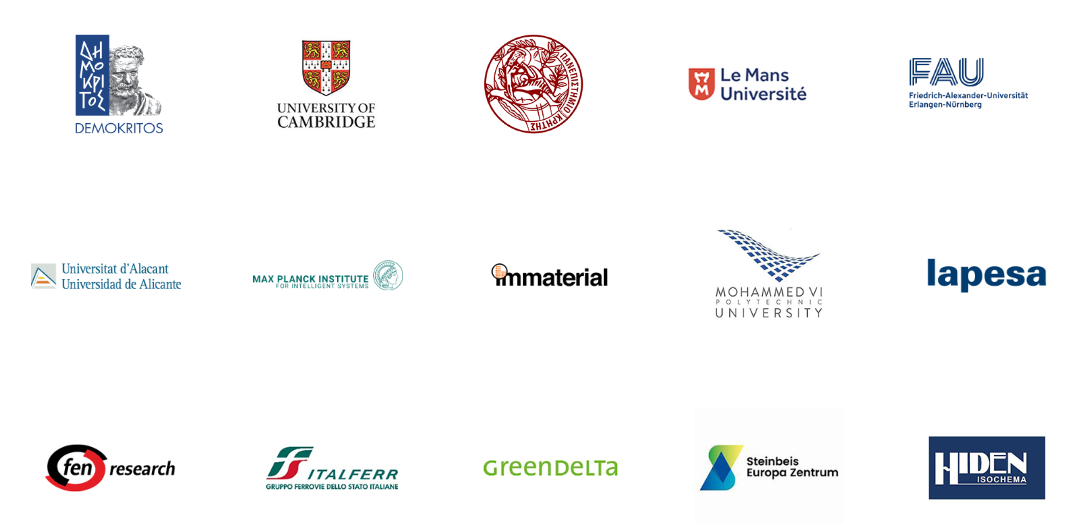MOST-H2
Novel metal organic framework adsorbents for efficient storage of hydrogenAbout the project

Widespread use of hydrogen as an energy carrier is a key priority for the EU. It is essential to achieve EU and national climate and energy transition targets. MOST-H2 works on an integrated multiscale lab-to-tank approach to develop, validate and demonstrate innovative, low cost, cryo-adsorptive hydrogen storage. It aims at developing monolithic Metal-Organic Framework (MOF) adsorbents with an optimal combination of volumetric and gravimetric capacity. The targeted materials can store hydrogen efficiently, will be easy and safe to transport, and have a small environmental footprint.
Background
MOST-H2, in full alignment with the requirements of HORIZON-CL4-2021-RESILIENCE-01-17, proposes an integrated multiscale lab-to-tank approach to develop, validate and demonstrate innovative, low cost cryo-adsorptive hydrogen storage, using monolithic Metal-Organic Framework (MOF) adsorbents, with an optimal combination of volumetric and gravimetric capacity, but also a small environmental footprint. Advanced synthetic strategies and sophisticated computational techniques, including molecular simulation and machine learning, will be combined in a cyclic materials development approach, to deliver new high performance, sustainable-by-design MOF adsorbents. The main aim is to computationally design, then synthesise and validate experimentally, ultra-porous MOFs with usable storage capacities above 10 wt% and 50 g/L on a materials basis, at an operating pressure below 100 bar. This represents an essential step towards more efficient, intrinsically safer and cost-effective storage solutions, compared to conventional hydrogen storage technologies. An important part of the project will be devoted to developing and upscaling monolithic forms of optimal MOF materials to allow easy integration into a cryo-adsorption storage tank, specifically designed for this purpose, which will be tested in a TRL 5 environment. The outcomes, coupled with full life cycle analysis and techno-economic assessment of MOST-H2 technology, with a view to selected end uses (rail and road applications), will form the basis for elaborating future market penetration plans through a solid horizontal dissemination and exploitation strategy.
GreenDelta in the project
- To gauge the application potential of MOF-based H2 storage systems in the EU rail and road transport sectors
- To assess the scalability, sustainability and social acceptance of the project’s outcomes at lab and full scales
- Environmental LCA and Life Cycle Costing of the different MOFs
- MOF synthesis will be assessed from cradle-to-gate (raw material extraction, linker synthesis, and MOF development)
- Environmental, Social and Cost Assessment, incl. Risk Assessment of the up-scaled material
- A full LCSA from cradle-to-grave will be performed, including Risk Assessment (raw material extraction, up-scaled linker synthesis, MOF monolith production, tank development, storage process, End-of-Life)
- Traditional storage processes will be analyzed for comparison
Partners
The parties working on this project are:

- National Center for Scientific Research “Demokritos” (Greece)
- Penepistimio Kritis (Greece)
- Université du Mans (France)
- Friedrich-Alexander-Universität Erlangen-Nürnberg (Germany)
- Universidad de Alicante (Spain)
- Max-Planck-Gesellschaft zur Förderung der Wissenschaften e.V. (Germany)
- Université Mohammed VI Polytechnique (Morocco)
- Laguens Y Perez SL (Spain)
- Lapesa Grupo Empresarial S.L. (Spain)
- FEN Research GmbH (Austria)
- Italferr S.p.A (Italy)
- GreenDelta GmbH (Germany)
- Steinbeis 2i GmbH (Germany)
- The Chancellor, Masters and Scholars of the University of Cambridge (United Kingdom)
- Immaterial Ltd (United Kingdom)
- Hiden Isochema Ltd (United Kingdom)

Links and resources
https://cordis.europa.eu/project/id/101058547
https://www.linkedin.com/company/most-h2/
Project duration: 2022 – 2026
Project target: Lab-to-tank hydrogen storage based on MOF adsorption
Project application: hydrogen storage and transport, for example railway sector
Funding: European Commission, RIA – Research and Innovation action
Call for proposal: HORIZON-CL4-2021-RESILIENCE-01